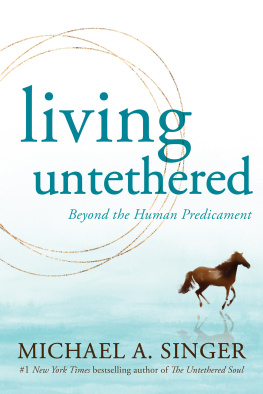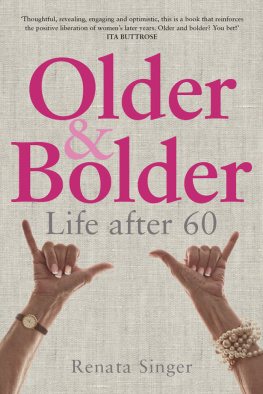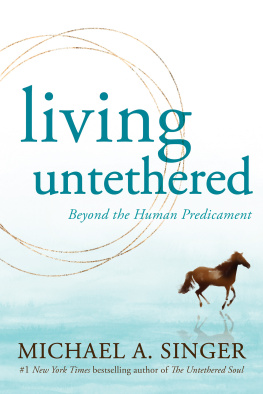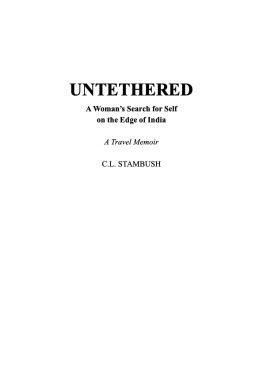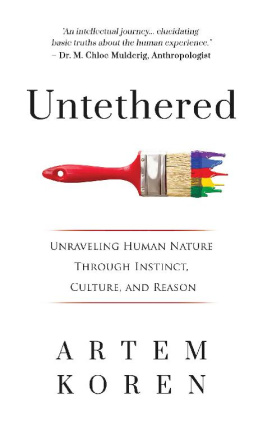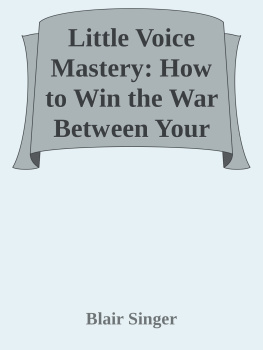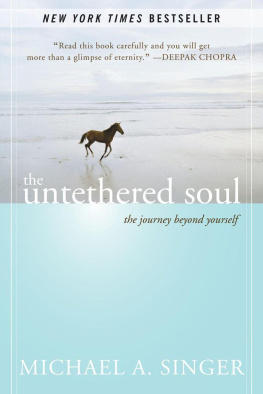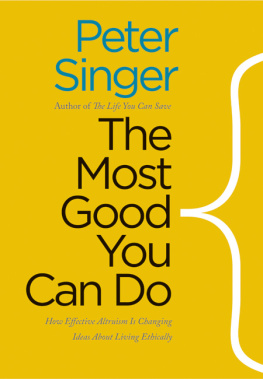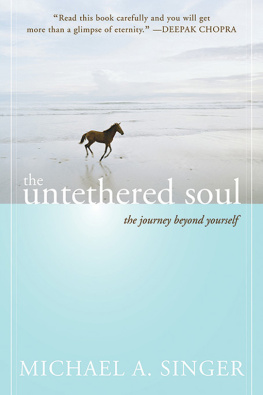Michael Singer - Living Untethered
Here you can read online Michael Singer - Living Untethered full text of the book (entire story) in english for free. Download pdf and epub, get meaning, cover and reviews about this ebook. year: 2022, genre: Religion. Description of the work, (preface) as well as reviews are available. Best literature library LitArk.com created for fans of good reading and offers a wide selection of genres:
Romance novel
Science fiction
Adventure
Detective
Science
History
Home and family
Prose
Art
Politics
Computer
Non-fiction
Religion
Business
Children
Humor
Choose a favorite category and find really read worthwhile books. Enjoy immersion in the world of imagination, feel the emotions of the characters or learn something new for yourself, make an fascinating discovery.
- Book:Living Untethered
- Author:
- Genre:
- Year:2022
- Rating:5 / 5
- Favourites:Add to favourites
- Your mark:
- 100
- 1
- 2
- 3
- 4
- 5
Living Untethered: summary, description and annotation
We offer to read an annotation, description, summary or preface (depends on what the author of the book "Living Untethered" wrote himself). If you haven't found the necessary information about the book — write in the comments, we will try to find it.
Living Untethered — read online for free the complete book (whole text) full work
Below is the text of the book, divided by pages. System saving the place of the last page read, allows you to conveniently read the book "Living Untethered" online for free, without having to search again every time where you left off. Put a bookmark, and you can go to the page where you finished reading at any time.
Font size:
Interval:
Bookmark:

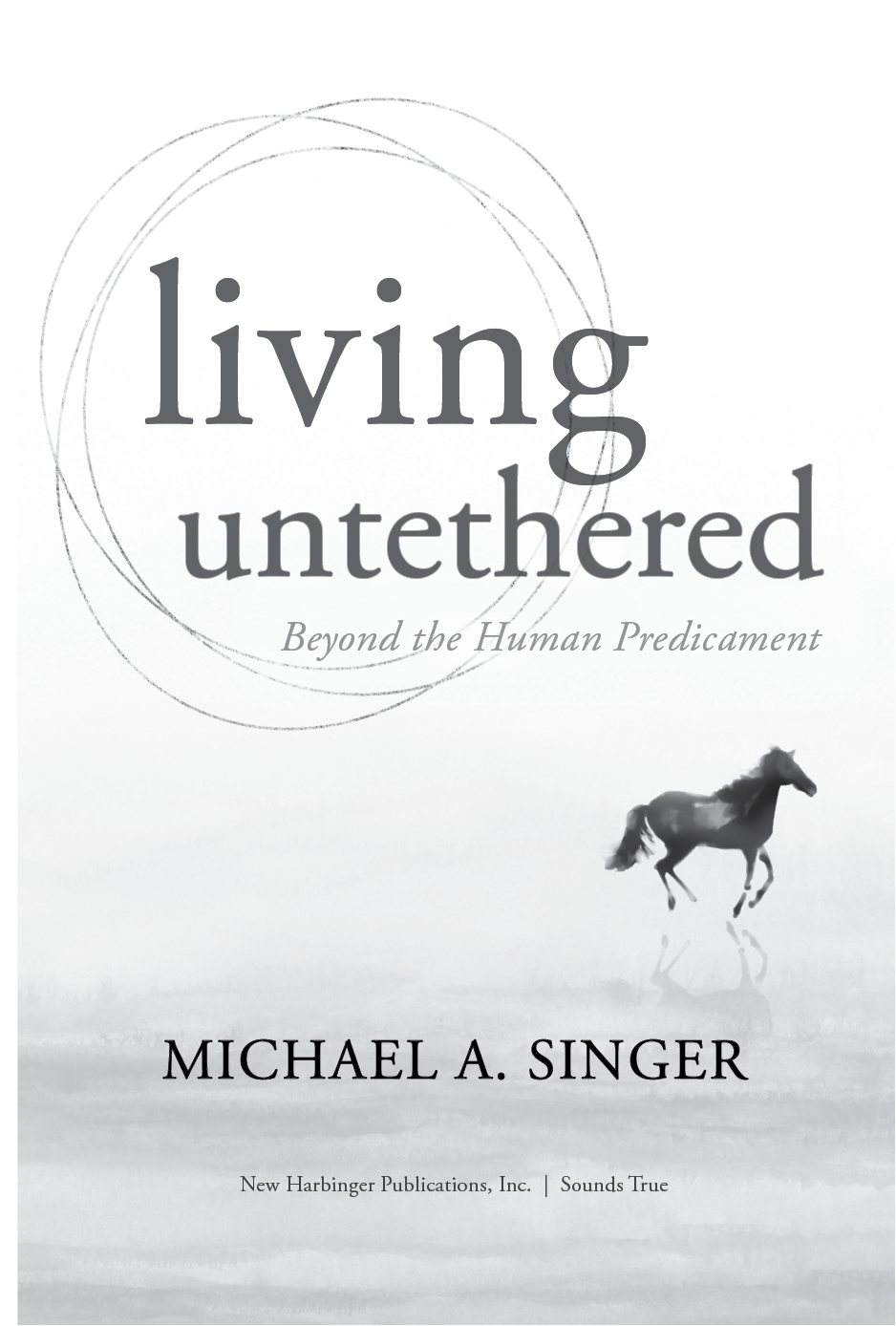
Publishers Note
This publication is designed to provide accurate and authoritative information in regard to the subject matter covered. It is sold with the understanding that the publisher is not engaged in rendering psychological, financial, legal, or other professional services. If expert assistance or counseling is needed, the services of a competent professional should be sought.
Character names originating in the Star Wars series, some of which are registered trademarks of Lucasfilm Entertainment Company Ltd. LLC, are used in this book pursuant to the Fair Use Doctrine for purposes of commentary and other transformative uses. No sponsorship or endorsement of this book by, and no affiliation with, the trademark owner are claimed or implied by the author or publisher.
Whispers from Eternity by Paramahansa Yogananda is published by Self-Realization Fellowship, Los Angeles CA.
All Bible verses are from the King James Version unless otherwise specified.
A copublication of New Harbinger Publications and Sounds True
Copyright 2022 by Michael A. Singer
New Harbinger Publications, Inc.
5674 Shattuck Avenue
Oakland, CA 94609
www.newharbinger.com
Cover and interior design by Amy Shoup; Horse illustration by Sara Christian; Acquired by Catharine Meyers; Edited by Jennifer Holder
All Rights Reserved
Library of Congress Cataloging-in-Publication Data on file
To the Masters
Contents
PART I:
Conscious Awareness
Chapter 1.
Awareness of Self
Sitting on a planet spinning through vast outer space for a handful of yearsin the broadest sense, this is the human predicament. Earth has been here for 4.5 billion years, yet each of us is limited to roughly an eighty-year ride on the planet, give or take a few years. We were born onto the planet, and we will leave it when we die. That is simply the truth. What is not such a hard and fast truth, however, is what our few years on Earth are like. Undoubtedly, life on the planet can be a very exciting experience. It can bring enthusiasm, passion, and inspiration at every turn. When it unfolds that way, every day can be a beautiful adventure. Unfortunately, life on Earth rarely unfolds exactly as we want it to, and if we resist, our experience can be quite unpleasant. Resistance creates tension and anxiety, and it makes life a burden.
To avoid this burden and be able to fully embrace life, wise ones throughout the ages have taught the importance of accepting reality. Only by accepting reality can we work with the flow of life as it passes by and create a better world. All of science is based on studying reality, learning her laws, and then working with those laws to improve our lives. Scientists cant deny reality; they must fully accept reality as the starting point of their endeavors. To fly, we must fully embrace the law of gravity, not deny its existence. The same is true in the spiritual realm. Teachings such as surrender, acceptance, and nonresistance form the basis of a deeply spiritual life. But these concepts can be difficult to grasp. In Living Untethered, we are embarking on a journey into the sheer reasonableness of acceptance and the great gifts it promises: freedom, peace, and inner enlightenment. Acceptance is best understood as nonresistance to reality. Try as you may, no one can make an event that has already happened not have happened. Your only choice is to accept the event or resist it. During our journey together, we will explore how and why you make this decision. But first you have to understand who is within that has the power to decide.
You are certainly in there ; you have an intuitive sense of existence inside. What is that? It is awareness of Self, the most important topic we could ever discuss. Since were going to take a deep dive into the spirituality of acceptance, we must start by understanding who is in there accepting or resisting.
There are many ways to approach the nature of Self. Lets go slowly and start with something very simple. Imagine someone comes up to you and asks, Hi. Are you in there? How would you respond? No one would actually say, No, Im not in here. That would be the ultimate non sequitur. If youre not in there, who responded? Youre definitely in there, but what does that mean?
To isolate what you in there means, imagine youre shown three different photographs. The photos are held up one after the other, and then youre asked, Though the photos changed, was it the same you who saw all three of them? Your response would be, Of course it was the same me. Very good; that helps us get our bearings. From this simple exercise, its clear that you in there are not what you look at; you are the one whos looking. The pictures changed; you who saw them stayed the same.
Its not hard to understand with photographs that you are not what you look at, but there are some objects we identify with more than others. For example, our bodies. We identify with our bodies enough to say, Im a forty-three-year-old woman who is five foot six. Is that really who you are in there: a forty-three-year-old, five-foot-six-inch female body? Or is the body something you in there are aware of? To sort this out, lets start with your hand. If you were asked whether you can see your hand, you would say, Yes, I see my hand. Okay, but what if it got cut off? Dont worry about the pain; just for a moment imagine its gone. Would you still be there? Wouldnt you notice that your hand is gone? Its like the changing photographs: When the hand was there, you saw it. When it was gone, you saw it was gone. You in there who sees did not change; what you were looking at changed. Your body is just another thing you see. The question remains: Who is in there doing the seeing?
Note that we didnt have to stop with the hand. Surgery has become so advanced that, with the help of a heart-lung machine and other medical devices, surgeons could remove a great deal of your bodyand the same sense of Self would still be in there, aware of the changes. How could you be your body if it changed that much, and you in there stayed the same?
Fortunately, to help you realize you are not your body, we dont really need to go that far. There is a much simpler, intuitive way to approach this. Surely youve noticed that your body didnt look the same when you were three, ten, twenty, or fifty years old. It certainly wont look the same when youre eighty or ninety. But isnt it the same you in there looking at it? When you were ten years old and you looked in the mirror, did you see what you see now? No, but wasnt it you lookingthen and now? Youve been in there the whole time, havent you? Thats the core, the essence, of everything were discussing. Who are you? Who is in there looking out through those eyes and seeing what youre seeing? Just like when you were shown the three photographs, you were not any of the photosyou were the one looking at them. Likewise, when you look out at the mirror, you are not what you seeyou are the one who sees it.
Little by little, through the use of these examples, we are revealing the nature of Self. Your relationship to what you see is always one of subject-object. You are the subject, and what you are looking at is the object. There are many different objects coming in through your senses, but theres only one subject experiencing them You.
Chapter 2.
The Conscious Receiver
Once you recognize that youre in there, youre going to notice that objects around you tend to distract your consciousness. A neighborhood dog barks, someone walks in the room, you smell the aroma of coffee, and your awareness is drawn to these objects. On a daily basis, you are so distracted by external objects that you rarely remain centered on You, the conscious receiver of these objects. Lets take a moment to examine the real relationship between this conscious receiver and the objects it is distracted by.
Font size:
Interval:
Bookmark:
Similar books «Living Untethered»
Look at similar books to Living Untethered. We have selected literature similar in name and meaning in the hope of providing readers with more options to find new, interesting, not yet read works.
Discussion, reviews of the book Living Untethered and just readers' own opinions. Leave your comments, write what you think about the work, its meaning or the main characters. Specify what exactly you liked and what you didn't like, and why you think so.

